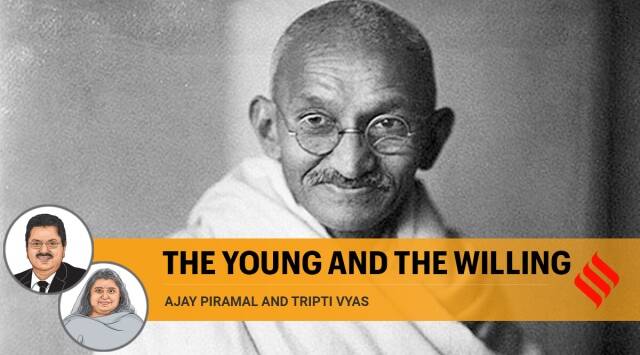
Mahatma Gandhi said of our youth, “If I was to be their real teacher and guardian, I must touch their hearts….I must help them to solve the problems that face them…and I must take along the right channel the surging aspirations of their youth.â€
The youth are leading global movements for change, with their energy, aspirations and fresh perspectives. India's real wealth is its youth (15-29 years), a staggering 27 per cent — over 320 million people. The is the largest youth population in any country, as per the International Labour Organisation. The significance of this is underscored in the UN Secretary General, Antonio Guterres's message at an India@75 event, 'Showcasing the India-UN Partnership in Action', where he stressed that, as home to the largest youth generation in history, India will be decisive in the success of the Sustainable Development Goals.
Given this, how are we building our wealth? Today, there is a gamut of academic avenues and skilling opportunities for our youth, with the government also establishing volunteering avenues. It is appreciable that, at a time when the average age of India is 28 years, the government is reviewing the National Youth Policy for the next 10 years to unlock the potential of youth to advance India, with entrepreneurship, youth leadership and development being the priority areas. This includes strengthening the youth volunteering ecosystem and developing 21st-century skills like inter-personal communication, collaboration, critical thinking, dealing with change and more.
Our education system, as it is right now, is not adequate for this time of exponential change. School education largely focusses on acquisition of literacy and numeracy, while higher education is creating technocrats and bureaucrats of the best and brightest minds. Against this backdrop, learners rarely get opportunities to reflect on what is most meaningful to them and the purpose of their lives, so that they can embark on self-transformation, act on their purpose and make a difference in the lives of others. The need of the hour is to tap into the hearts and minds, the passion, compassion and innate spirit of service within the youth so that they evolve into humane, ethical leaders of tomorrow, imbued with the spirit of sewa bhaav, creating ripples of change in a dramatically different future.
Acknowledging this, the National Education Policy 2020 stresses that “the purpose of the education system is to develop good human beings capable of rational thought and action, possessing compassion and empathy, courage and resilience, scientific temper and creative imagination, with sound ethical moorings and values.â€
The youth are intrinsically passionate about being key contributors to the country's growth story. Volunteering gives them opportunities to work through real challenges, be enriched by experiences and make meaningful changes. Volunteering needs to be re-imagined such that it can engage youth in nation-building not only from the spirit of giving, but also from the spirit of learning and of receiving knowledge, wisdom and insights from communities across the country, thereby shaping their young minds and hearts.
It is heartening that the Youth Policy calls out to develop India's youth through volunteering, expanding opportunities for leadership development and mobilising technology to establish a vibrant youth enablement platform to build a cadre of youth leaders across the country.
Fellowships such as the Gandhi Fellowship, established a decade ago by the Piramal Foundation, is an immersive journey undertaken at the grassroots of India that provides in-depth experience across areas of public health, education and water. The Fellowship has paved the way for the development of sewa leaders, with 3000-plus Gandhi Fellows and Alumni spread across 23 states of India, working across multiple domains fuelled by their innate spirit of selflessness, as they spearhead large-scale changes across the nation. They are essaying key roles as advisors to chief ministers, featuring in Forbes 30 under 30, and as social entrepreneurs who are changing the world. Since inception, Gandhi Fellows have been living the motto of “Build Self, Build Nationâ€, as they continue to inspire thousands of self-motivated youth across India to follow a less trodden path.
The NIRMAN programme by SEARCH at Shodhgram in Gadchiroli also works to facilitate a pro-social purpose of life among the youth and nurture them as social changemakers, while the Ashoka Changemakers initiative aims to build youth leaders.
However, much more needs to be done given our large youth population, through increased support to the government from the corporate and social sectors in co-creating more opportunities to nurture and enable youth to become champions of change.
Swami Vivekanand said, “Give me 100 energetic youth and I will change Indiaâ€. It is time to give wings to the aspirations of our youth by moving from policy to action. Education institutes at all levels, public and private, need to recognise this concept of sewa leadership and incorporate it in their programmes. Multi-sectoral support in establishing more volunteering platforms across the country, along with revamping existing government ones and increasing visibility to promote volunteering like Unnati, Nehru Yuva Kendra and National Service Scheme will bring in more youth.
The advantage of our large youth population will remain only a numerical strength unless we proactively and consciously focus on their overall development through tapping into the nation-builder and sewa leader within them so that they go on to spearhead a culture of innovation, entrepreneurship and diversity, and an ethos of compassion to create a thriving India.
(The writers are Ajay Piramal and Tripti Vyas; views are personal)
This article was first published on 03 October 2022, on The Indian Express
TAGS
SHARE





